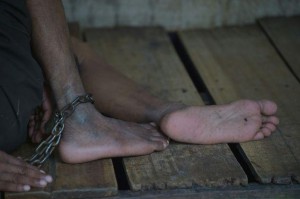by Patricia Luki
In March 2016, the Human Rights Watch released an article and a video of how a mental health institution in Indonesia treats their mentally ill patients. The article talked about how most of the individuals in that institution was chained to their beds and were fed inhumanely (Human Rights Watch, 2016).
I was born and raised in Indonesia, and I have heard stories and have seen people who are mentally ill or disabled being locked up in their own home or in an institution. However, I have never imagined that it would grabbed an international media’s attention, and I am pretty sure that not many people in Indonesia are aware of this as well. Moreover, this resulted in having some of my American friends shared this article to me. It was very difficult to explain to my American friends that there is lack of support for the mentally ill, or even for individuals with physical or developmental disabilities in Indonesia. For example, Indonesia has a population of 250 million people; however, there are only 600 to 800 psychiatrists and 48 mental hospitals (Human Rights Watch, 2016). Not only that, people who are admitted in these mental health institutions were forced to take medications or subjected to “alternative” medicines, such as herbs, traditional massages and Quran reading in the person’s ear (Human Rights Watch, 2016). It sounds bizarre, but yes, this is something that is happening right now on the other side of the world. Although this practice of locking up patients in confined spaces, also known as pasung, was banned by the government in 1977, families, traditional healers and staffs in the institutions still continue to use this method on individuals with mental illness or disabilities (Human Rights Watch, 2016). When you look at Indonesia from this perspective, anyone would probably say “Oh wow, this country needs help.” And yes, we definitely do need a lot of help.
Community psychology is a field that has a strong interest in social justice, community education and building public awareness (Langhout, 2015). When I was reading Langhout article, I realized that Indonesia is still lacking in social justice, community educating and public awareness on most things, especially regarding mental health and disability rights. Also, Indonesia’s mental illness problems originated from the lack of community awareness, community education and government involvement and control (Human Rights Watch, 2016). Just like many other developing countries, there is still a huge stigma towards the mentally ill, and with the addition of the lack of appropriate services, the fate of these people are in the hands of “professionals” who mostly do not know what they are doing or what they need to do. For example, I have encountered many of my relatives who refrained themselves from taking their children with developmental disabilities outside because they still think that the “sickness” can be contagious. There is still lack of awareness what mental illness is and how to treat people with mental illness or disabilities in Indonesia. Many Indonesians still adhere to traditional herbs or alternative methods in healing any kind of diseases, even cancer!
It is scary if I think about how Indonesia is behind in having proper mental health care and laws. The Human Rights Watch said that the government should amend to the 2014 Mental Health Act to ensure that people with mental illness and other disabilities have the same rights as other Indonesians (2016). I also think that it is very crucial for Indonesia to increase the number of community-based programs and more trained professionals and staffs to educate the community and provide better services for people with mental illness and disabilities. Also, the field of community psychology is not as advanced or maybe even unknown to some universities in Indonesia. My goal is to become a BCBA and bring back the knowledge back home so that children with developmental disabilities will be able to get the proper services and improve their quality of life. However, if Indonesia does not change its laws or take actions in improving how they treat the mentally ill, I’m afraid that there is only little I can do back home. Indonesia still has a long way from advanced mental health care and proper laws for the mentally ill and disabled, and Indonesia is definitely still far away from free if there are still people chained up in their wooden beds in mental health institutions.
The video based on the Human Rights Watch article can be viewed here: https://www.youtube.com/watch?v=RBa-wwcakHM. #UML #commpsych
Patricia Luki is a graduate student in the Autism Studies department at the University of Massachusetts Lowell.
References
Barry, A. (Photographer). (2016). A mentally ill man is shackled at the Bina Lestari Mandiri healing center in Brebes [digital image]. Retrieved from http://jakarta.coconuts.co/2016/03/21/living-hell-human-rights-watch-report-details-horrific-conditions-mentally-ill-kept
Human Rights Watch (2016, March 20). Indonesia: End Shackling of People With Disabilities. Retrieved September 06, 2016, from https://www.youtube.com/watch?v=RBa-wwcakHM
Human Rights Watch (2016, March 20). Indonesia: Treating Mental Health With Shackles. Retrieved September 06, 2016, from https://www.hrw.org/news/2016/03/20/indonesia-treating-mental-health-shackles
Langhout, R. D. (2015). Considering Community Psychology Competencies: A Love Letter to Budding Scholar-Activists Who Wonder if They Have What It Takes. American Journal of Community Psychology, 55(3-4), 266-278. doi:10.1007/s10464-015-9711-5

